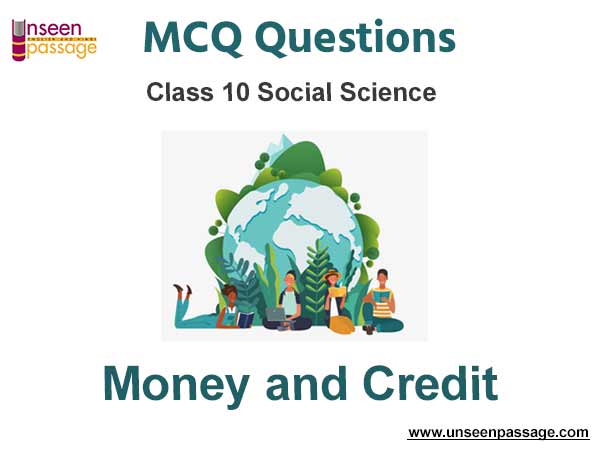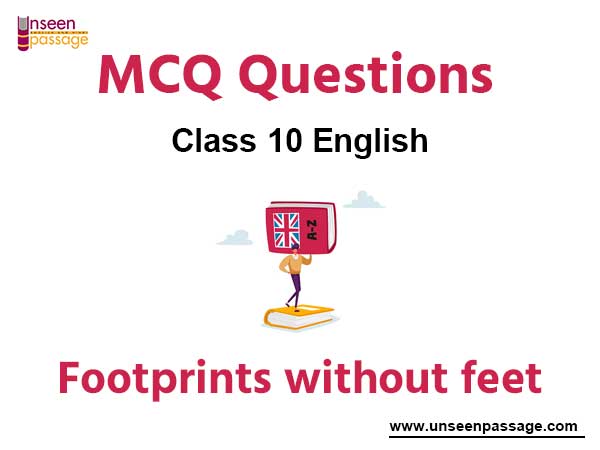Money and Credit MCQ Class 10 Social Science
Please refer to Chapter 3 Money and Credit MCQ Class 10 Social Science with answers below. These multiple-choice questions have been prepared based on the latest NCERT book for Class 10 Social Science. Students should refer to MCQ Questions for Class 10 Social Science with Answers to score more marks in Grade 10 Social Science exams. Students should read the chapter Money and Credit and then attempt the following objective questions.
MCQ Questions Class 10 Social Science Chapter 3 Money and Credit
The Money and Credit MCQ Class 10 Social Science provided below covers all important topics given in this chapter. These MCQs will help you to properly prepare for exams.
Question. Which of the following banks issues currency notes on behalf of the Central government to:
(a) State Bank of India
(b) Commercial Bank of India
(c) Industrial Bank of India
(d) Reserve Bank of India
Answer
D
Question. No individual in India can:
(a) Legally refuse a payment made in rupees
(b) Legally refuse a payment made by cheque
(c) Legally refuse a payment made by draft
(d) All the above
Answer
A
Question. Sometimes lenders demand against loan:
(a) Payment
(b) Cheque
(c) Draft
(d) Collateral
Answer
D
Question. Interest rate, security and documentation requirement, and the mode of repayment together comprise what is called the:
(a) Loan factor
(b) Credit factor
(c) Terms of loan
(d) Terms of credit
Answer
D
Question. Money is something that can act as a medium:
(a) For exchange of commodities.
(b) For exchange of goods
(c) Of exchange in transactions
(d) None of the above
Answer
C
Question. In early ages, Indians used grains and cattle as:
(a) Money
(b) Food
(c) Public property
(d) None of the above
Answer
A
Question. The RBI monitors the banks are actually maintaining:
(а) Cash books
(b) Cash balance
(c) Cash register
(d) None of the above
Answer
B
Question. Most of the informal lenders charge:
(a) A less interest on loans
(b) A much higher interest on loans
(c) Can be both (a) and (b)
(d) None of the above
Answer
B
Question. An agreement in which the lender supplies the borrower with money, goods or services in return for the promise of future payment is called:
(a) Loans
(b) Debt
(c) Credit
(d) All the above
Answer
C
Question. In rural areas, the main demand for credit is for:
(a) House loan
(b) Education
(c) Crop production
(d) All the above
Answer
C
Question. The rich households are availing cheap credit from formal lenders whereas the poor households:
(a) Do not get a loan
(b) Get loan at a much less interest
(c) Have to pay a heavy price for borrowing
(d) None of the above
Answer
C
Question. Cheap and affordable credit is crucial for:
(а) The development of urban areas
(b) The development of rural areas
(c) The country’s development
(d) All the above
Answer
C
Question. Farmers usually take crop loans at the beginning of the season and repay the loan after:
(a) Sowing
(b) Tilling
(c) Harvesting
(d) All the above
Answer
C
Question. Credit sometimes, pushes the borrower to a situation from which recovery is:
(а) Easy
(b) Hard
(c) Very painful
(d) None of the above
Answer
C
Question. About 85 percent of the loans taken by poor households in the urban areas are from:
(a) Formal sources
(b) Informal sources
(c) Mixed sources
(d) None of the above
Answer
B
Fill in the blanks
Question. The ……………………… currency is without any use of its own
Answer
modern
Question. Demand deposits share the essential features of ……………………… .
Answer
money
Question. The ……………………… lender include moneylenders, trader relatives, friends, etc.
Answer
informal
Question. Cheap and affordable credit is crucial for the ……………………… development
Answer
country’s
Question. A ……………………… is a paper, instructing the bank to pay a specific amount from the person’s account to the person in whose name it has been made.
Answer
cheques
Question. Repayment of the loan is crucially dependent on the ……………………… from farming.
Answer
income
Question. Credit pushes the person into a ……………………… trap.
Answer
debt
Question. Banks use the major portion of the deposits to extend ……………………… .
Answer
loans
Write true (T) or false (F)
Question. Banks use the major portion of the deposits to extend loans.
Answer
True
Question. There is a huge demand for loans for various economic activities.
Answer
True
Question. Since, money acts as an intermediate in the exchange process, it is called a medium of exchange.
Answer
True
Question. The modern currency is without any use of its own.
Answer
True
Question. The other form in which people hold money is as grains and cattle.
Answer
False
Question. Banks accept deposits and also pay an interest rate on the deposits.
Answer
True
Question. What a person desires to sell is exactly what the other wishes to buy.
Answer
True
Question. In a barter system, goods are indirectly exchanged with the use of money
Answer
False
Question. People’s money is not safe with the banks.
Answer
False
Question. The modem forms of money are closely linked to the working of the modern banking system.
Answer
True
Question. Sometimes, farmer’s in order to pay loan have to sell a portion of their land.
Answer
True
Question. Collateral refers to security.
Answer
True
Question. Banks keep a large proportion of their deposits as cash for themselves.
Answer
False
Question. Banks in India these days hold about 15 percent of their deposits in cash.
Answer
True
Question. Banks mediate between those who are in need of money with those who do not want money.
Answer
False
Match the following
| Column-A | Column-B |
| 1. Formal loans refers to | (а) loans from moneylenders, relatives, etc |
| 2. Informal loans refers to | (b) increase earnings |
| 3. Collateral refer to | (c) debt traps |
| 4. Credit helps | (d) loans from Bank and Post Office |
| 5. Loans lead to | (e) security |
Answer
1. → (d), 2. → (a), 3. → (e), 4. → (b), 5. → (c)

We hope you liked the above Money and Credit MCQ Class 10 Social Science. In case you have any questions please put them in the comments box below and our teachers will provide you a response.


